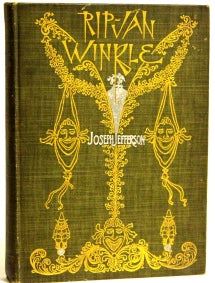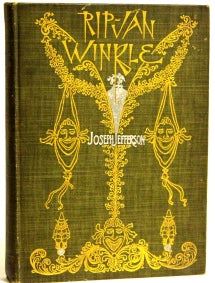Goldsboro Books
0Rip Van Winkle
Rip Van Winkle
Publisher Dodd Mead and Company
Genre: General Fiction
Publication date:
Available from:
- Signed by Joseph Jefferson
- UK First Edition
- First Printing
- Hardcover
Out of stock
Couldn't load pickup availability
Limited Edition Copies
View full details
-
Professionally Packed
All of our books that have a dust wrapper are covered in clear protective, removable film and are packed professionally in bubble wrap and a box for shipping so that they reach you in perfect condition.
-
Book Condition & Notes
Dodd Mead, New York, 1896. Hardcover. Book Condition: Very Good. No Jacket. First edition. 1896, First Edition. Signed by Joseph Jefferson to Harry Farjeon 'from his loving Grandfather.' Dated Christmas 1896. Small quarto, Illustrations throughout in two states (India proof sheets and regular). Green cloth with gold illustrations embossed. Some wear to edges of spine. Pages heavy handmade paper, unopened mainly. 199 pp., illustrated with vignettes and plates. Very RARE; no copies signed currently for sale of this edition, nor have any appeared recently at auction. Jefferson's dramatization of Irving's famous story was so well received that he has often been called a one-part actor, despite being known nationally for playing many other roles including some Shakespearean ones to acclaim. Joseph Jefferson, commonly known as Joe Jefferson (February 20, 1829 – April 23, 1905), was an American actor. He was the third actor of this name in a family of actors and managers, and one of the most famous of all American comedians. Jefferson bought a place called Orange Island in Louisiana where he built a home after the Civil War. The location is at a peninsular area on Lake Peigneur, and was subsequently renamed Jefferson Island. Harry Farjeon (6 May 1878 – 29 December 1948) was a British composer. Harry Farjeon was born on 6 May 1878 in Hohokus Township, New Jersey, United States, the eldest son of author Benjamin Farjeon, who was from the East End of London, and Margaret, the daughter of American actor Joseph Jefferson. His parents returned to Britain when he was a baby, and he lived in Hampstead in London for the rest of his life. His younger sister, Eleanor Farjeon (b. 1881), with whom he shared a rich imaginary life, wrote children's books and poetry, including the hymn, Morning Has Broken. His younger brothers were J. Jefferson Farjeon (b. 1883), novelist, and Herbert Farjeon (b. 1887), writer of theatrical revues.
About the book
The story of Rip Van Winkle is set in the years before and after the American Revolutionary War. In a pleasant village, at the foot of New York's Catskill Mountains, lives kindly Rip Van Winkle, a colonial British-American villager of Dutch ancestry. Van Winkle enjoys solitary activities in the wilderness, but he is also loved by all in townespecially the children to whom he tells stories and gives toys. However, he tends to shirk hard work, to his nagging wife's dismay, which has caused his home and farm to fall into disarray.
One winter day, to escape his wife's nagging, Van Winkle wanders up the mountains with his dog, Wolf. Hearing his name called out, Rip sees a man wearing antiquated Dutch clothing; he is carrying a keg up the mountain and requires help. Together, they proceed to a hollow in which Rip discovers the source of thunderous noises: a group of ornately dressed, silent, bearded men who are playing nine-pins. Rip does not ask who they are or how they know his name. Instead, he begins to drink some of their moonshine and soon falls asleep.
He awakes to discover shocking changes. His musket is rotting and rusty, his beard is a foot long, and his dog is nowhere to be found. Van Winkle returns to his village where he recognizes no one. He discovers that his wife has died and that his close friends have fallen in a war or moved away. He gets into trouble when he proclaims himself a loyal subject of King George III, not aware that the American Revolution has taken place. King George's portrait in the inn has been replaced with one of George Washington. Rip Van Winkle is also disturbed to find another man called Rip Van Winkle. It is his son, now grown up.
Rip Van Winkle learns the men he met in the mountains are rumored to be the ghosts of Hendrick (Henry) Hudson's crew, which had vanished long ago. Rip learns he has been away from the village for at least twenty years. However, an old resident recognizes him and Rip's grown daughter takes him in. He resumes his usual idleness, and his strange tale is solemnly taken to heart by the Dutch settlers. Other hen-pecked men wish they could have shares in Rip's good luck and had the luxury of sleeping through the hardships of American Revolution.
Collapsible content
About the Author
Washington Irving
Collapsible content
GPSR EU Safety Information
1. Manufacturer Contact Information
Goldsboro Books Ltd - 23-27 Cecil Court, London, WC2N4EZ, enquiries@goldsborobooks.com, 02074979230
2. EU Authorised Representative Information
Easy Access System Europe - Mustamäe tee 50, 10621 Tallinn, Estonia, gpsr.requests@easproject.com
3. Safety Warnings
Not applicable







